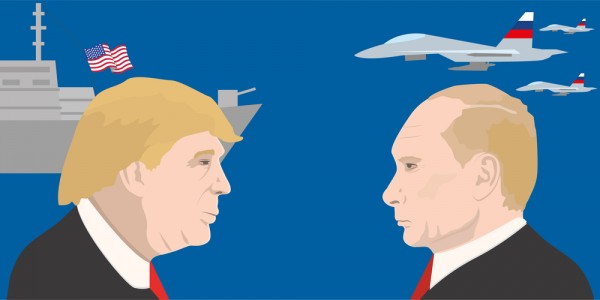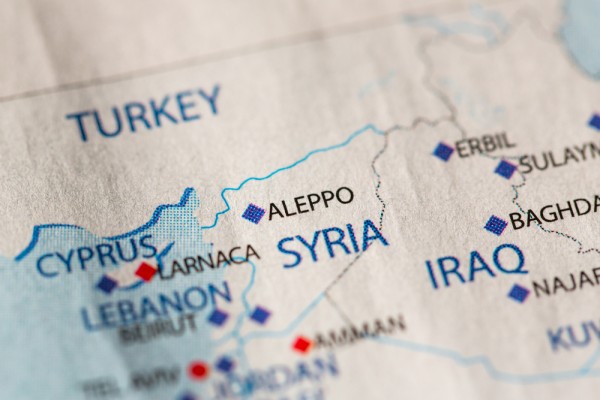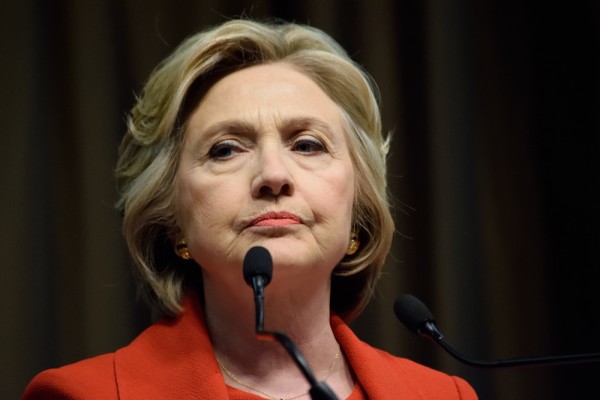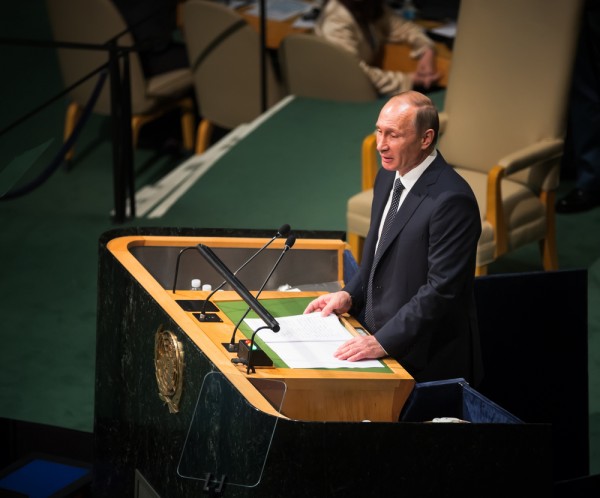
Putin’s March 1st presentation of new Russian weapons has been greatly misunderstood as a declaration of strategic parity or triumphalism. There was a much more urgent need, namely, to prevent an imminent strike. This danger is not over yet, for a week later, on March, 7, President Putin emphasized his readiness to employ the nuclear weapons for retaliation purposes, even if it would end the world.
“Certainly, it would be a global disaster for humanity; a disaster for the entire world,” Putin said, “but, as a citizen of Russia and the head of the Russian state I must ask myself: Why would we want a world without Russia?”
This was a bold answer. A lesser man would probably reply hypocritically, dodging the brutal “yes, I shall destroy the world.” It means that the danger is still imminent, and that by these frank words President Putin wants to dissuade whoever intends to push him too far.
Why indeed, all of a sudden, did the Russian President decide now, of all times, to tell the world about these new weapons? It’s not that the Russians (or the Americans, for that matter) are accustomed to deliver hardware updates orbi et urbi. And 2002, the year the US withdrew from the ABM treaty, was consigned to history years ago. What was the reason, or at least the trigger?
Some observers bet it was a wily pre-election trick aimed at a domestic audience. This could be a consideration, but a minor one. The leading opponent of Mr Putin, the communist candidate Mr Grudinin, didn’t argue against Putin’s foreign policy or defence spending; the voters do approve of Putin’s foreign policy, anyway. Putin’s revelation made Russians proud, but they would vote Putin anyway.
The reason for Putin’s speech was a different and more urgent one: a terrible crescendo of threats had made Russia feel very vulnerable. Presumably their spy agencies convinced the Russian leader the threats were real.
The US establishment has been looking for a way to humiliate and punish Russia since Mueller’s indictment of 13 Russians. The indictment alleged that “the Russian conspirators wanted to promote discord in the United States and undermine public confidence in democracy,” in the words of Rod Rosenstein, the deputy attorney general overseeing the Mueller’s inquiry. It did not matter that the indicted Russians weren’t officials of the Russian state; that their effort (if these existed at all) were puny: a few ads at the cost of about $100,000, a drop in the ocean compared to the vast amounts of money spent by both the Clinton and Trump campaigns. However, the US establishment called these minor actions of private Russian citizens an “act of war.”
On February 19, Glenn Greenwald summed up the US reactions in the piece called A Consensus Emerges: Russia Committed an “Act of War” on Par With Pearl Harbor and 9/11. He reminded us that Senators from both parties, such as Republican John McCain and Democrat Jeanne Shaheen, have long described Russian meddling in 2016 as an “act of war.” Hillary Clinton described Russia’s alleged hacking of the DNC and John Podesta’s email inbox as a “cyber 9/11.” Tom Friedman of the New York Times said on “Morning Joe” that Russian hacking “was a 9/11-scale event. They attacked the core of our democracy. That was a Pearl Harbor-scale event.”
After the indictment, this comparison became a common place rhetoric. “The Washington Post’s Karen Tumulty, complaining about President Donald Trump’s inaction, asked readers to “imagine how history would have judged Franklin D. Roosevelt in the aftermath of Pearl Harbor, if he had taken to the radio airwaves to declare that Tokyo was ‘laughing their asses off.’ Or if George W. Bush had stood in the rubble of the World Trade Center with a bullhorn and launched a name-calling tirade against the Democrats.”
Greenwald concluded: “If Russian election meddling is on par with the Pearl Harbor and 9/11 attacks, then should the U.S. response be on par with its response to those attacks?” In other words, the US politicians and media called to give Russia the same treatment the US gave to Japan (Hiroshima and Nagasaki) and to Afghanistan (invasion followed by 16 years of occupation).
In the search for escalation from fiery talk to fire, the Anglo-American establishment turned to the familiar device of alleged Syrian gas attacks. People have been trained to respond to such accusations (and alternatively, to keep mum while the US bombs Mosul and Raqqa, or prepares to nuke North Korea). Assad and Russia were accused of gassing the rebel stronghold of Eastern Ghouta, the West’s last chance to enforce regime change in Syria by virtue of its location near the capital.
The alleged gas chlorine attack was reported on February 25th, and it was immediately denied by the Russians and the Syrians. The Russian Foreign Minister Sergey Lavrov said that this anonymous ‘bogus report’ had been originated in the US in order to denigrate Syrian government and its troops, to accuse them of war crimes and to cause permanent breakup of Syria. The US and its allies, he said, were “simply exploiting baseless allegations of toxic weapons use by Damascus as a tool of anti-Syrian political engineering”.
The rebels said they were attacked by chlorine gas, as opposed to previous times when they claimed gas sarin was used. Chlorine gas is a tricky stuff; it is not deadly though unhealthy for inhaling. It is also quite difficult to monitor and verify, for chlorine is widely used for domestic purposes from cleaning bathrooms to purifying water and is not a banned substance (though the gas chlorine is forbidden). This difficulty to verify had made it an easy one to claim.
The situation in E. Ghouta was a replay of Aleppo; reports of wounded children, films produced by the White Helmets, and stubborn attempts by the rebels to prevent civilian exodus from the area. Whenever the rebels are pushed hard, they produce a story of suffering civilians and of gas attacks, hoping the US will force the Syrian government and their Russian allies to relent.
Undoubtedly civilians have suffered in the Syrian war; however, there is a way to end their suffering. The rebels could lay down their arms and join the political process, like everybody else. There are plenty of Americans unhappy with the Trump regime, but they do not shell Washington DC; they hope for a better and different outcome at the next elections. Their example can be emulated by the Syrian rebels, and then, the civilians won’t suffer.
If that’s too much to ask for, they can let the civilians leave; and fight to the bitter end. But no, they do not let the civilians out; instead, they produce reports of civilians suffering and wait for the Mounties to ride in and save them.
There was an extra angle. The rebels of E. Ghouta are trained and led by British and American intelligence officers, and they came under Russian fire. Perhaps it was a Russian payoff for the bombardment of oil field installations near Deir ez-Zor where the Russian private military company (called Wagner after their leader nickname’s) bore the brunt of and suffered many casualties. Thierry Meyssan, the well known French journalist resident in Damascus claimed that Russian ground troops also participated in the assault on Eastern Ghouta. It is possible that the Russians and the Americans are already fighting directly, though both sides are loth to admit their losses.
The British Foreign Secretary Boris Johnson was the first to “seriously consider” air strikes in Syria. He missed the fun of Libya (“we came, we saw, he died”) and now the redhead is eager to bomb anybody. However, his Parliament does not allow him to do so.
The ball was taken up by the Americans. Bloomberg editorialized: “It’s time for another red line, one that the U.S. won’t back away from. Trump should tell Assad and his Russian backers that any more proved use of any chemical weapon, including chlorine, will be met with even greater retaliation than what happened in April.”
[This is a reference to Trump’s cruise missile strike on Syria’s Shayrat air base, allegedly in revenge for Syrian sarin gas attack in Khan Sheikhoun. Doubts about this “sarin gas attack” emerged right away, and Unz.com published it quickly. In June 2017, Seymour Hersh exposed the full story behind Shayrat: there was no “sarin attack”, and President Trump was told by his own intelligence officers to drop the case. He still insisted and attacked but warned the Russians in advance, and there were no Russian or Syrian casualties, and very little damage at the cost of $100 million to the US taxpayer. The US mainstream media was exuberant, and congratulated Trump with this example of Presidential behaviour.]
The American Conservative, the Republican and Trump-friendly site objected to plans to bomb Syria: “Trump had no authority to order the attack on Syrian forces last year, and he still doesn’t have it now. There is no international mandate for U.S. forces to be in Syria, nor is there any authorization for military action against Syrian government forces or their allies. If Trump orders another illegal attack, the U.S. will be committing more acts of war against a government that poses no threat to us, has done nothing to us or our treaty allies, and is still fighting inside its own internationally recognized borders.”
But voices of those supporting the strikes and punishing Russians and Syrians sounded stronger. “White House considers new military action against Syrian regime,” wrote The Washington Post on March, 5. The newspaper added details who pushed for the attack (national security adviser H.R. McMaster) and who objected (Defense Secretary Jim Mattis). “Other officials, particularly at the White House and the State Department, appear more open to renewed action against Assad,” said the report.
This is the background of Putin’s speech of March 1st. The Russian president spoke of the new Russian missiles impervious to Aegis and unstoppable by ground fire that can turn the US aircraft carriers, the most potent symbol of the US power, into sitting ducks. Russia will sink them in case of an attack on Russia or on her allies, said Putin.
‘Allies’ is the keyword in the message. The threatened ally of Russia is Syria. Putin warned the Americans that their air strike on Syria may be answered with a strike upon their Carrier Strike Group (CSG) in the area. If you bomb Damascus, we shall send your CSGs in the Med and in the Gulf down to the sea bottom. We can incinerate your air bases in the area, too.
The sharply raised stakes were a game-changer. Who knows what will be the Russian response on this or other action of the Western allies? The warlike neocons say Russia is all talk, all bluff. Realists say that the US may suffer the humiliating and painful loss of its CSGs with thousands of lives at sea. The US President had enjoyed the previous strike of Syria with dozens of Tomahawks before returning to his beautiful chocolate cake. If the strike were revisited upon the striking SCGs – this is totally different matter. Did you say Pearl Harbour?
Even if this exchange would not lead to massive nuclear strikes of the mainland US and Russia and total world-destroying war, it would have a very high price tag. The Russians can even strike President Trump’s private club in Palm Beach, Fla as they naughtily presented on the mock video.
Apparently, President Trump discussed it now with the UK Prime Minister Theresa May. The Brits are for some reason more keen to push for war with Russia. Now they try their best to stop the rapprochement between the US and Russia. The peculiar story of poisoning their own ex-spy with a nerve gas adds spice to their effort, and the Russian Embassy UK Twitter troll twitted: “In today’s papers: pundits call on @Theresa_May to disrupt possible Russia-US thaw. No trust in Britain’s best friend and ally?”
The nuclear poker game just became more exciting. Are the Russians bluffing, or aren’t they? Will they play, or will they drop their cards, this is the question. There is no answer yet. Only history can answer it.
Meanwhile, judging by the tense calm in the Middle East and elsewhere, Putin’s game had been successful. The US missiles rested at their launching sites, and so did the Russian ones. The Russian-Syrian offensive in E. Ghouta proceeds unabated, while the US ground operations in Syria came to standstill, as the Kurds are too busy confronting the Turks. Perhaps we shall survive this almost-confrontation, as we have survived the 2011 almost-confrontation.
Israel Shamir can be reached at adam@israelshamir.net
This article was first published at The Unz Review.


















